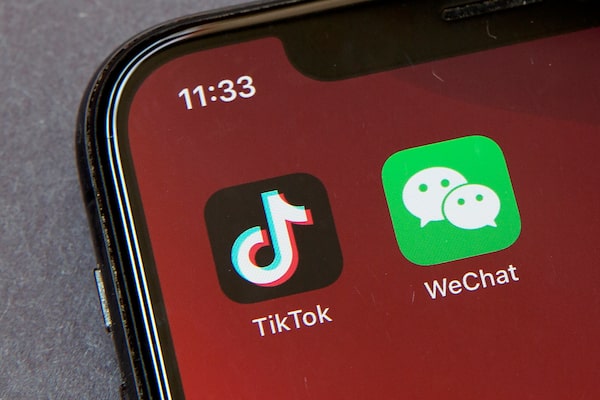
WeChat has joined TikTok on the list of Chinese-owned apps banned from use on Canadian federal government devices.Mark Schiefelbein/The Associated Press
Ottawa has barred Chinese social-media application WeChat from federal government phones, saying it collects too much information on its users.
The ban, announced Monday, also covers applications by Kaspersky Lab, a Russian-based cybersecurity company that offers protection against computer viruses.
“The Chief Information Officer of Canada determined that WeChat and Kaspersky suite of applications present an unacceptable level of risk to privacy and security. On a mobile device, the WeChat and Kaspersky applications’ data collection methods provide considerable access to the device’s contents,” Canada’s Treasury Board Secretariat, currently headed by Anita Anand, said in a statement.
WeChat is the third Chinese technology brand that has seen its usage in Canada restricted by the federal government in about 16 months. Ottawa barred Huawei Technologies’ equipment from Canada’s 5G wireless network in May, 2022, citing national security and the need to safeguard the country’s telecommunications infrastructure. In February, Ottawa banned social-media platform TikTok from federal government devices, citing, like it did for WeChat, an “unacceptable level of risk to privacy and security.”
WeChat, a Chinese-language platform owned by Shenzhen-based conglomerate Tencent, was used to target Conservative MP Michael Chong in May, according to a report released earlier this year by the Global Affairs Canada (GAC) unit responsible for tracking disinformation. The government said the information operation on the platform “amplified a large volume of false or misleading narratives about Mr. Chong,” who has frequently raised concern about Chinese state foreign interference in Canada as well as Beijing’s repression of Uyghurs and its crackdown on Hong Kong.
The Treasury Board said this ban is “in line with the approach of our international partners,” but officials at the agency were not able to immediately provide a list of other governments that barred WeChat from their devices when asked Monday.
The federal government said WeChat and Kaspersky applications will be removed from mobile devices as of Monday, Oct. 30, and that users will be blocked from downloading them in the future.
“While the risks of using these applications are clear, we have no evidence that government information has been compromised,” the Treasury Board said.
A number of U.S. state governments have banned WeChat and other Chinese tech applications. In 2021, the Indian government made a ban on any usage of more than 50 Chinese applications permanent, including WeChat and TikTok.
Ronald Deibert, director of the Toronto internet-security and human-rights organization Citizen Lab, said the ban appears to be prudent given his group’s research. He said Citizen Lab has found that “the accounts of international WeChat users are under surveillance and that data-sharing practices on the company side are opaque and subject to broad cybersecurity laws in China, which put all WeChat users at risk of government surveillance.”
A 2020 Citizen Lab report found WeChat communications conducted entirely among non-China-registered accounts are “subject to pervasive content surveillance that was previously thought to be exclusively reserved for China-registered accounts.”
Dan Stanton, a former manager in counterintelligence at the Canadian Security Intelligence Service who is now director of the national-security program at the University of Ottawa’s Professional Development Institute, lauded the federal government’s ban. He said there is no doubt that WeChat is used by the People’s Republic of China to go after critics and to spy for the authoritarian regime.
“WeChat is used by the PRC government for foreign interference,” he said, noting Mr. Chong’s case.
“This was to spread false narratives about his identity, claims about his background, political stances and family’s heritage. So by tying WeChat to PRC nefarious activity, it’s not a stretch to imagine the PRC having backdoor access to users of the app.”
More than one million people in Canada use WeChat, according to marketing firm estimates cited by the GAC report.
Senator Yuen Pau Woo, who represents British Columbia in the Red Chamber, said this ban will disproportionately affect people in the Canadian government who maintain links with China and with Chinese communities in Canada.
“Absent a clear statement on the unique risks posed by WeChat compared to the many other apps in circulation, this decision represents a further closing of the Canadian mind in our relations with China and with the Chinese world,” Mr. Woo said in a statement.
He said he would like to know precisely what WeChat data-collection methods are deemed objectionable and whether they are significantly different from other popular applications in the West – and the extent to which Canada’s decision is driven by the need to be in line with the approach of its international partners.
“For all the frivolous and sometimes harmful information propagated on WeChat, the app provides an unmatched window on the preoccupations of Chinese users and is an invaluable tool for keeping in touch with counterparts in China and the Chinese diaspora.”
Relations between the West and China have worsened over its treatment of Uyghurs, its quashing of dissent in Hong Kong and its menacing of Taiwan. Last fall, in a foreign-policy paper, Canada labelled China as a disruptive force trying to bend the international order for its own purposes, and Western countries have grown more wary of China over its Ukraine war-era partnership with Russian President Vladimir Putin.
 Steven Chase
Steven Chase Robert Fife
Robert Fife